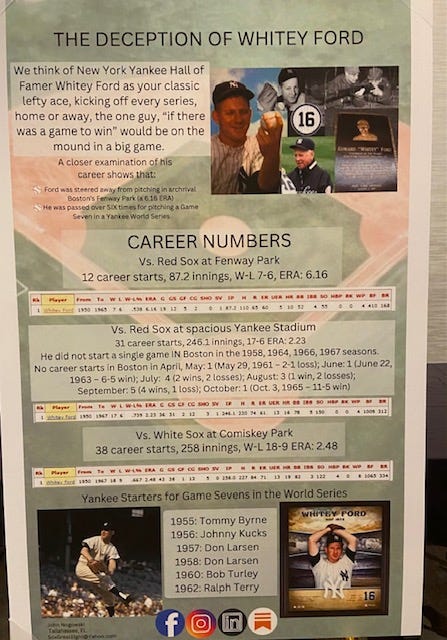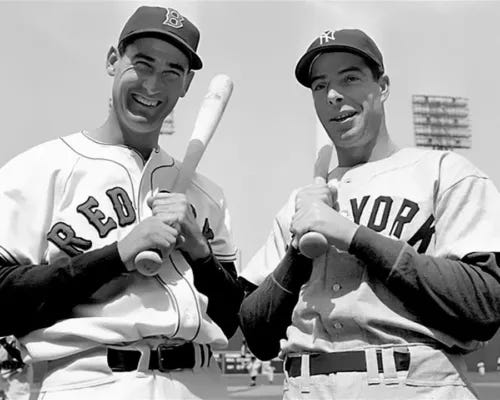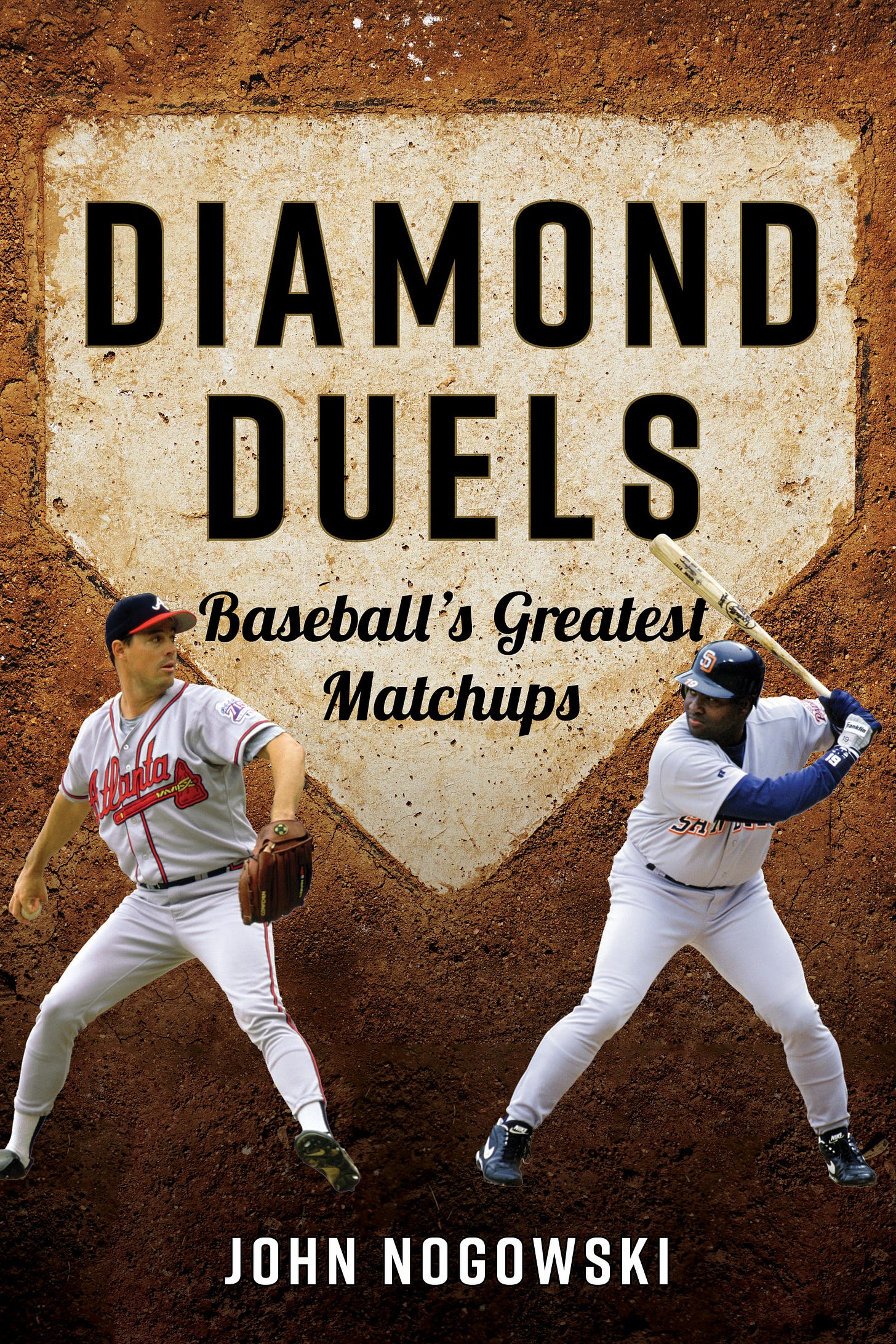Ted vs. Joe: What a rivalry!
"Diamond Duels" examines the careers of Williams and DiMaggio
EDITOR’S NOTE: Here I am in Irving, Texas on the final day of the SABR 53 (Society of American Baseball Research) national convention and I continue to be surprised by the number of New York Yankee hats, jerseys, uniform tops among the folks here. It’s not that I didn’t expect to see some — we all know about the Yankee Dynasty, especially where I grew up in New Hampshire. But I figured most of ‘em were gone by now. Or maybe I hoped they’d be gone by now. (Just kidding) Sorta.
I’m wrapping up my portion of the SABR National Event with today’s poster presentation. My poster? About one Edward “Whitey” Ford and his spurious career numbers, displayed on my poster, displayed below.

“Whitey” Ford had 73 lifetime starts vs. the White Sox, only 42 vs. the arch-rival Red Sox!
Since my poster is entered into competition with all sorts of other SABR folks, many, I fear who are Yankee fans, I’m somewhat fearful to see how my poster will be received.
I might be worried for no reason. After all, facts are facts, right? He had a 6.16 ERA at Fenway Park, which explains, perhaps, why he didn’t throw a single pitch there for four full seasons. And a few weeks back, I presented my book “Diamond Duels” to the Casey Stengel SABR Chapter in New York City and prepared myself for the onslaught when I brought out Ford’s spurious record at Fenway Park AND the fact that he never pitched a Game Seven in the Yankees’ multiple (yes, yes, we know how many World Series they were in) World Series’ finales.
Instead, they were receptive, said things like “That’s fascinating.” And “How come we never heard that on Yankeeography?”
Which leads me to Part Two of Nogo vs. The DAMN Yankees (and yes, they earned that appellation) Ted Williams vs. Joe DiMaggio. If you are a believer in the WAR statistic (not what our President seems to be trying to stir up) it’s a definitive win for Ted. But in researching “Diamond Duels” and noting that Ted TWICE won the Triple Crown and was beaten out of the win by Yankees (DiMaggio once, Joe GORDON, once) what really ticked me off was when Williams lost the MVP vote to Gordon, who had a fine season, a hardly memorable Yankee reliever named Joe Page, who won 14 games in relief for a team that won the pennant by a dozen games, received SEVEN first-place MVP votes (you would assume from NY writers) and Ted Williams, Triple Crown winner for a second time, got THREE! And one more thing.
I did not include this statistic in “Diamond Duels” because I never thought to question DiMaggio’s fielding numbers. The New York press wrote stuff like he never had for a ball he had such great judgment and was a miraculous fielder and blah, blah, blah.
HE MADE 17 ERRORS TO LEAD THE LEAGUE IN ERRORS FOR AN OUTFIELDER IN 1937. THEN HE MADE A REMARKABLE IMPROVEMENT NEXT SEASON. HE ONLY MADE 15 (still led the league.)
So it might have been at that point I wondered if maybe the New York media, regarding the activities of Joseph Paul DiMaggio and Whitey Ford and many other Yankees, did not exactly tell us the truth, the whole truth and nothing but the truth. Which prompted me to write a lengthy, detailed, thorough look comparing Williams and DiMaggio’s careers with Ted clearly, unquestionably in my view, having had the superior career. If not on teams with surrounding casts as formidable as the Yankees.
Yankee fans, as we know, have always talked about DiMaggio in hushed tones. Not only was he a great ballplayer, he married Marilyn Monroe. And Paul Simon included him in a song. How could you possibly question him?
Since my “Diamond Duels” chapter does just that, I’ve been anticipating a backlash from Yankee Nation somewhere along the line. So far, and they’ll be judging my Whitey Ford poster in a half-hour — so it could still happen — I’ve eluded the bluster. Pray for me, friends…NOGO
IN CASE YOU MISSED MY TED vs. JOE CHAPTER EXCERPT, HERE GOES.
Writing “Diamond Duels” gave me a chance to really dig into the careers of Ted Williams and Joe DiMaggio and comparing what the two did on the field —particularly against one another — with an in-depth chapter that will be a highlight, (I think,) of the book. I also got a chance to study the media coverage of the two and how it very likely had a serious impact on the Most Valuable Player award at least twice and maybe their entire careers. Can you imagine winning THE TRIPLE CROWN twice and NOT winning the MVP? “Diamond Duels” — my deep dive into baseball’s historic matchups, is available on Amazon for Yankee fans, too.
They seemed to be joined at the hip, in some ways. Ted Williams of the Boston Red Sox and Joe DiMaggio of the New York Yankees were probably the two most dominant baseball players of their era. As players and as people, they couldn’t have been more different.
Ted was loud, profane, a truly scientific student of the art of hitting a baseball who could explain the Bernoulli Principle and meticulously tie a fly while he was doing it. He didn’t drink or smoke, got right in the face of sportswriters who pissed him off and always seemed to be in a battle somewhere, wives, writers, but never the umpires or managers. He lived life large from the time he arrived in the big leagues. When the rookie was advised about the show he’d see in BP, Ted shot back “Wait’ll Jimmy Foxx sees ME hit.” That was Ted Williams.
Joe was intense, a nervous, chain-smoking, withdrawn, soft-spoken man, obsessed with one thing, something he was always asking teammates “How’d I look?” He paid no attention to his statistics, played the game hard but also carefully manipulated his image with the New York media to the point where if a writer DARED to write anything the least bit critical, DiMaggio would cut him off, he was dead to the world.
Even the great Red Smith, as important a sportswriter as we’ve ever had, was buffaloed. “I told myself not to worry. Someday there would be another DiMaggio,” he wrote. Then Red died. (Really!)
Ted Williams and Joe DiMaggio - American League rivals
What was interesting in researching their head-to-head matchups, the Yankees vs. the Red Sox, of course, the Yankees dominated the series but in the individual games between the two of them, there really weren’t all that many where either Ted or DiMaggio dominated like you might think. Ted hit .345 lifetime against the Yanks, a point higher than his career average. DiMaggio was nine points higher than his career mark, hitting .334 against the Red Sox. But the Yankees had better pitching, Williams had almost three times as many walks as Joe D. (when in doubt: Walk him) and if you’re a believer in WAR (Wins Above Replacement), Williams was a far superior player, 123.1 WAR to DiMaggio’s 78.1.
Ted’s numbers are unapproachable, even with the two career interruptions for World War II and Korea. Yet when it came to the sportswriters of the day, the ones who voted every year for the league’s MVP, you had to wonder what in the world they were thinking. IF they were thinking.
DiMaggio was the MVP in 1941, the year of his 56-game hitting streak. His Yankees won the pennant, too. So give him that one. But Williams’ stats were considerably better: Ted hit .406 to Joe’s .357, hit 37 HRs to Joe’s 30, Joe had a five RBI edge, 125-120 but Ted had 147 walks to Joe’s 76 with a .553 on-base percentage, .113 points higher than DiMaggio. Ted even hit higher than Joe during that 56-game streak.
A year later, Ted got shafted again, winning the AL Triple Crown - .356, 36, 137 with 145 walks and a league-leading 141 runs scored. Yet the writers gave the MVP to the Yankees’ Joe Gordon, who had a nice year - .322, 18, 103, impressive numbers for a second baseman but come on. And get this: The other two first-place votes went to Ted’s teammate Johnny Pesky, who hit .331 with no power and one for ex-Red Sox star Vern Stephens, who hit .294 for the St. Louis Browns with 14 HR and 92 RBI. Those three votes go to Ted — as they should have — and it’s a tie.
In 1947, it was worse. Ted won the Triple Crown again - .343, 32, 114 with 162 walks, a .499 OBP and a 1.133 OPS (smokin’ numbers) and they gave the MVP to DiMaggio, who hit .315, 20 HR, 97 RBI. Joe got 8 first-place votes to narrowly win over Ted.
But the hosing was this: Yankee reliever Joe Page (14-8, 2.48) out of the pen, got 7 first-place votes and was fourth overall for a Yankee team that won the AL by a dozen games. Yeah, the bullpen was key.
For his spectacular season, a second Triple Crown, Williams got just three first-place votes, the same as the Yankees’ immortal George McQuinn (have you ever even heard of him?) McQuinn finished sixth in the voting hit .304, 13, 80, hit .248 the next year and retired.
How in the world could a sportswriter give him three first-place votes instead of Williams? Or the idea of a 14-game winner — as a reliever — like Page for a team that won by 12 games? And he gets SEVEN first-place votes? Think the New York media made a difference?



